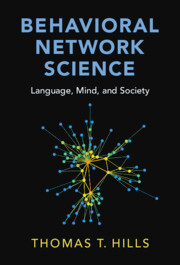Book contents
- Frontmatter
- Contents
- Additional Resources
- Introduction: Structure Matters
- Part I A Brief Guide to Network Science
- Part II Language
- Part III Mind
- Part IV Society
- 14 Network Illusions: How Structure Misleads Us
- 15 Group Problem Solving: Harnessing the Wisdom of the Crowds
- 16 The Segregation of Belief: How Structure Facilitates False Consensus
- 17 The Conspiracy Frame: Coherence through Self-Supporting Beliefs
- 18 The Kennedy Paradox: Games of Conflict and Escalation
- 19 Fund People Not Projects: A Universal Basic Income for Research
- References
- Index
18 - The Kennedy Paradox: Games of Conflict and Escalation
from Part IV - Society
Published online by Cambridge University Press: 08 November 2024
- Frontmatter
- Contents
- Additional Resources
- Introduction: Structure Matters
- Part I A Brief Guide to Network Science
- Part II Language
- Part III Mind
- Part IV Society
- 14 Network Illusions: How Structure Misleads Us
- 15 Group Problem Solving: Harnessing the Wisdom of the Crowds
- 16 The Segregation of Belief: How Structure Facilitates False Consensus
- 17 The Conspiracy Frame: Coherence through Self-Supporting Beliefs
- 18 The Kennedy Paradox: Games of Conflict and Escalation
- 19 Fund People Not Projects: A Universal Basic Income for Research
- References
- Index
Summary
What are the contexts that give rise to cooperation as opposed to conflict? When should we love thy neighbor, turn the other cheek, or escalate? Game theory is an effort to formalize this problem such that we can ask what decisions we should make when the consequences of those decisions depend on the decisions of others. By this accounting, war is a game, as is negotiation, rock-paper-scissors, and love making. The difference is in the payoffs. Being rational is about making decisions that lead to the best outcomes. The hawks and doves of political foreign policy – who advocate for more or less aggressive military intervention – are rational beings in this world, because the nature of the payoffs demands certain kinds of responses. The pragmatics of high stakes games underpin quotes like John F. Kennedy’s "We can secure peace only by preparing for war." But is Kennedy’s statement rational by the logic of the game in which it is embedded? Is it rational when games of conflict are played repeatedly in a network of global interactions? By combining game theory with network science, we can make some progress toward understanding these issues.
Keywords
Information
- Type
- Chapter
- Information
- Behavioral Network ScienceLanguage, Mind, and Society, pp. 296 - 319Publisher: Cambridge University PressPrint publication year: 2024
